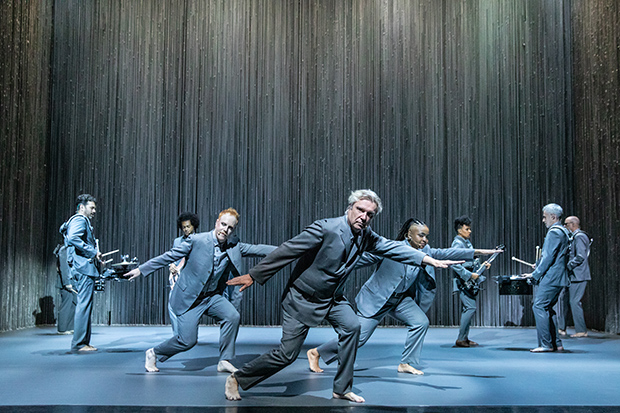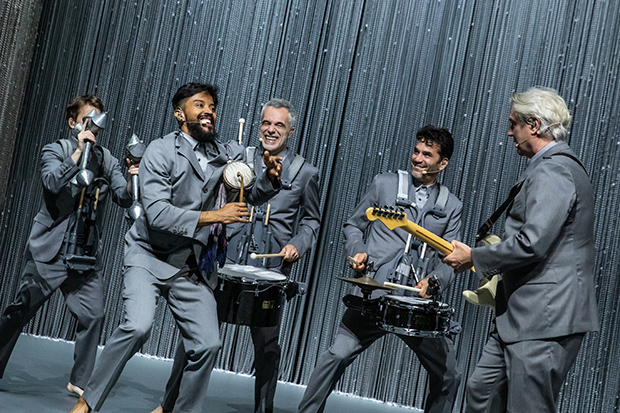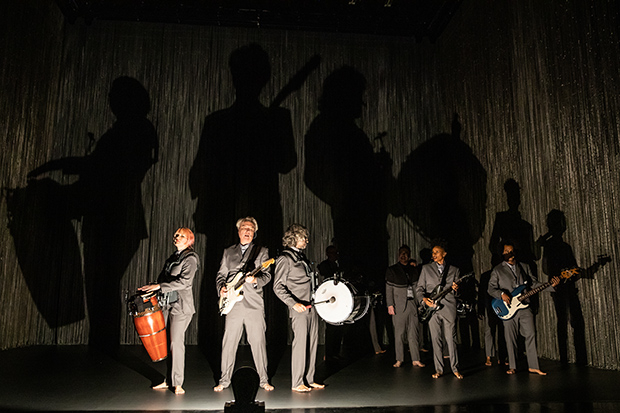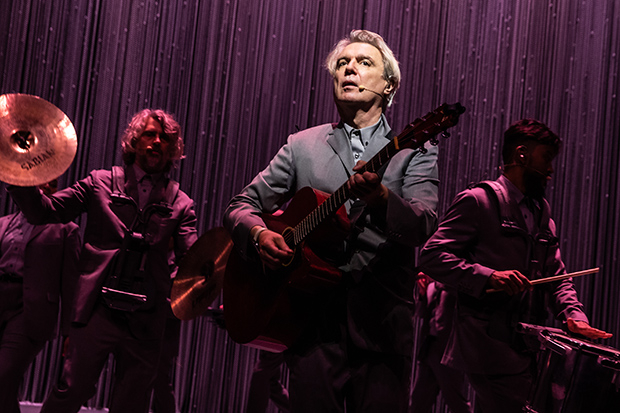REVIEW: American Utopia Is David Byrne's Blissful Vision of What the World Could Be
Director Spike Lee brings the sold-out Broadway sensation to HBO…and boy, could we use it right now.

(© Matthew Murphy)
Thirty-six years separates Spike Lee's new concert documentary David Byrne's American Utopia from Stop Making Sense, Jonathan Demme's classic 1984 concert film featuring David Byrne with his post-punk rock band Talking Heads. Whereas Byrne exuded an awkward, near-alien aura with his band members in the earlier film, American Utopia — premiering on HBO on Saturday, October 17 — presents Byrne as a more approachable, almost grandfatherly figure, albeit one who still holds on to those eccentricities you've grown to love. No wonder Byrne's show became a sold-out sensation at Broadway's Hudson Theatre from October of last year to this past February. There was Byrne, not so much providing an escape hatch from the strange and even frightening world outside, but filtering it all through his unique perspective and inviting us to have some fun with it.
In that sense, the show's opening number, "Here" — one of five songs in Byrne's set that come from his 2018 solo album American Utopia — functions as a stealth sum-up of Byrne's singular appeal. Seeing him on a sleekly minimalist, gray stage (no production designer is credited) singing about the intellectual and emotional possibilities of the different parts of the human brain, one realizes that, even in his younger Talking Heads days, there was always a kind of innocent detachment underpinning even his darkest tunes. In songs like "Psycho Killer" (absent from this set) and "Once in a Lifetime" (ebulliently present), Byrne married musical inventiveness and verve with a scientific curiosity about subjects ranging from the psychology of a serial killer to the disappointments of middle-class life.

(© Matthew Murphy)
That childlike sense of wonder — something we all inevitably struggle to maintain as adults — is his utopia. What makes it distinctly American is its inclusivity. Byrne has always displayed a cultural voraciousness in his music, from experimenting with African polyrhythms in the 1980 Talking Heads album Remain in Light to adopting Latin influences in Naked (1988) as well as in much of his solo career. All of that is on full display in American Utopia, as is a backing company of dazzling musicians and performers encompassing a wide range of racial and cultural stripes. Race figures into the show's most explicitly political number, a cover of Janelle Monáe's 2015 protest song "Hell You Talmbout" that implores us to remember all the Black victims of police shootings. (It also features Spike Lee's most overt directorial intervention, with shots of blown-up photographs of Michael Brown, Freddie Gray, Emmett Till, and more cut into the number, and mentions of recent victims Ahmaud Arbery, George Floyd, Breonna Taylor, and many others afterward.)
Such a moment, as well as an unexpected kneeling tribute to Colin Kaepernick during "I Should Watch TV" and an interstitial moment in which Byrne talks about voting in the United States, garners the expected applause from an audience that is probably already primed to support such sentiments. Byrne may be preaching to the liberal choir, but one could also more generously read such gestures as his way of acknowledging that, even in this paradise he's trying to create for us all inside the theater, one can't entirely shut out the darker forces lurking just outside its doors. We need to accept the bad with the good in order to live in this world. Why not embrace joy when we can?

(© Matthew Murphy)
And there is certainly no shortage of joy in American Utopia (my colleague Zachary Stewart's description of this show as a "musical joy machine" when he saw it on Broadway last October is entirely apt). Beyond the songs themselves, it's the sheer freedom of movement onstage, punctuated by Annie-B Parson's peppy modernistic choreography, that intoxicates, the spare staging allowing us to fully savor the exuberance. Spike Lee appears to have embraced that spirit in filming the performance. Ellen Kuras's cinematography feels freed from spatial restrictions, sometimes going behind the beaded three-sided onstage curtain to capture the performers, other times embracing God's-eye-view shots, the better to appreciate some of Rob Sinclair's more imaginative lighting designs. The camera even seems to be bouncing along with the audience during the company's performance of "Burning Down the House."
It all culminates in the show's encore number, "Road to Nowhere," that not only closes the film on a blissful high note, but beautifully sums up Byrne's ironically hopeful perspective. Rarely had resignation in the face of adversity been expressed so jubilantly than in that 1985 song, and its implicit message of carrying on against overwhelming odds especially resonates now. American Utopia is David Byrne's vision of what the world could be, and in the moment, it sure feels wonderful.

(© Matthew Murphy)








